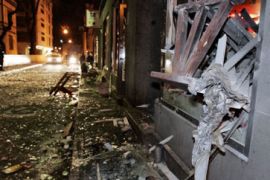 |
| Sir David Frost |
Every week, Sir David Frost, one of the most celebrated broadcasters, offers you a programme which takes its stories and guests from every part of the globe.
The world’s news makers will be interviewed with Sir David’s incisive style.
Sir David will get behind the headlines and examine the decisions and policies which shape global politics toda
|
Coming up this week on Frost over the World:
|
Toomas Hendrik Ilves
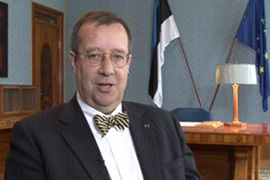 |
Estonia’s president talks about being the latest
target of Russian displeasure |
For the past three weeks Estonia has been under attack – but there is not a gun or bomb in sight.
Instead the computers that serve the country’s banks, schools, media and government ministries have been suffering serious disruption and even the president’s own website has been rendered inaccessible.
Sir David Frost talks to Toomas Hendrik Ilves, Estonia’s president, about who is responsible and how Estonia will deal with the attack.
Relations between Estonia and Russia have deteriorated since a Soviet war memorial in the Estonian capital, Tallinn, was moved and the president discusses the ways in which Russia has made it’s displeasure felt, including cancellations of orders for Estonian goods and the emergence of ‘entrance to Estonians and dogs forbidden’ signs in the windows of Russian shops.
Lebanese clashes
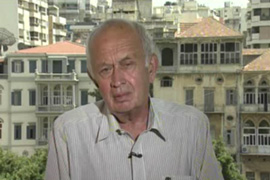 |
| Timor Goksel, former Unifil spokesman |
The clashes between the Lebanese army and Fatah al-Islam fighters have brought more misery to the country.
Timor Goksel, a former Unifil spokesman, joins Sir David Frost from Beirut to discuss the situation and he argues that Fatah al-Islam is just one more addition to the Lebanese scene, where militia’s – both religious and secular – are free from state or police control.
Sir David Frost asks him about the strength of Fatah al-Islam, whether the events in the north of the country are linked to the bombings in and around Beirut and whether another civil war appears imminent?
World’s richest shipwreck
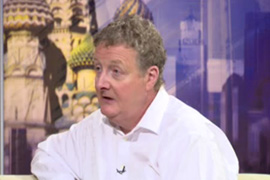 |
| Mike Williams, law lecturer |
The world’s richest shipwreck has been discovered with about half a billion US dollars in gold and silver coins onboard.
The wreck was located somewhere in the Atlantic ocean by a US-based marine exploration company and the treasure has already been shipped to the US.
Sir David Frost is joined by Rex Cowan, a salvager, Alex Hildred, a marine archeologist, and Mike Williams, a law lecturer, to discuss who owns the wreck and its treasure, who should profit from it and whether it should be regarded as marine archeology and, as such, be off limits?
Sophie Ellis-Bextor
 |
| Sophie Ellis-Bextor |
Singer Sophie Ellis-Bextor has just released her third album and initial reports indicate that it is a great success.
It took two-and-a-half years to make and she wrote between 70 and 80 songs before making her final selection for the album.
She joins Sir David Frost to discuss taking her time over the album, having the opportunity to collaborate with others and loving what she does.
Amnesty International report
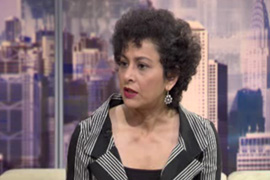 |
Irene Khan, secretary-general of
Amnesty International |
Amnesty International has just published its annual report and it makes for pretty sorry reading.
The usual suspects appear but countries like the UK and US also come in for criticism.
Irene Khan, the secretary-general of Amnesty International, joins Sir David Frost to discuss who the worst human rights abusers are and how these abuses can be curtailed in the future.
She highlights the ongoing situation in Darfur and the world’s failure to do anything about it and the examples of the kidnapping and torture of terror suspects along with the tightening of civil liberties under new terror laws that earn the UK and US a place in the report.
Nawaz Sharif
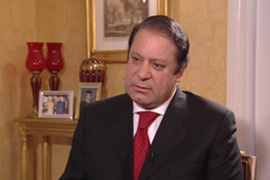 |
| Nawaz Sharif, former Pakistani prime minister |
With weeks of anti-government strikes and protests and 41 people killed in recent violence in Karachi, Pakistan appears to many to be slipping into anarchy.
Sir David Frost talks to Nawaz Sharif, the former Pakistani prime minister, who was overthrown by Pervez Musharraf’s military coup in 1999.
The two-time prime minister watches the current crisis in Pakistan from exile and explains to Sir David Frost that he cannot predict what will happen next in the country but that he would like to return to stand in free and fair elections.
He discusses his relationship with Benazir Bhutto, also an exiled two-time Pakistani prime minister, and whether their alliance could lead them to unite in any future elections.
Frost Over The World airs at 18:00GMT every Friday on Al Jazeera English and is repeated during the week.
To suggest a guest for future shows or to make a comment click on ‘Send your feedback’ at the top of the page
To continue the debate on world events, please visit the
Your Views section of the website
